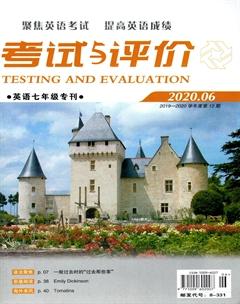Unit 11词语和句型考点归纳
王秀凤
1. interested, interest, interesting
interested 意为“感兴趣的”,具有被动含意。通常由人作句子的主语,表示人的感受,在句中通常作表语,与介词in连用时,表示“对……感兴趣”。如:
Are you interested in music? 你对音乐感兴趣吗?
Some boys are interested in robots. 一些男孩对机器人感兴趣。
interest作名词,意为“兴趣;趣味”;作动词,意为“使(人)产生兴趣”。 如:
The trip interested me. 这个旅行让我感兴趣。
She shows an interest in reading and writing. 她对阅读和写作感兴趣。
拓展:类似这样的词还有:excited / exciting; surprised / surprising; moved / moving; worried / worrying等。
interesting意为“有趣的”,有主动含义,句子的主语可以是人也可以是物。在句中既可以作表语,也可作定语。如:
The trip is very interesting. 这次旅行真有趣。
The boy wants to have an interesting birthday party. 那个男孩想举办一次有趣的生日聚会。
2. hear v. 听到;听见
hear意为“听说”,后可跟从句。常用短语搭配:hear of 意为“听说;听到”,后跟名词或代词;hear from意为“收到……来信”。如:
Do you hear of that story? 你听过那个故事吗?
How often do you hear from your sister? 你多久收到一次你姐姐的信?
【辨析】 listen & hear
listen 表示“听”,强调动作,如果listen后面接宾语要加介词to,listen to... 表示“倾听”;而hear表示“听见,听到”,强调结果。如:
What are you listening to? 你们在听什么?
We are listening to the singing of the bird in the tree. 我們在听树上鸟的叫声。
Listen! Can you hear anything in the next room? 听!你能听到隔壁房间里有什么声响吗?
They listened but could hear nothing. 他们听了,却什么也没有听见。
3. feed v. 喂养;饲养
feed用作及物动词, 意为“饲养;喂养”;也可作不及物动词,意为“食;吃”,其过去式为fed。常用短语搭配:feed... to ...意为“把……喂给……吃”。feed后接饲料或食物名词作宾语, to为介词,其后一般接表示动物或婴儿的名词作为对象;feed on 意为 “以……为食,靠……为生”。如:
His job is to feed animals in the zoo. 他的工作是在动物园里喂养动物。
Please feed some grass to the sheep. 请给羊喂些草。
The woman fed the water to the baby. 这位妇女给婴儿喂了水。
People in the north feed on rice. 南方人以大米为主食。
4. grow v. 种植;生长;发育
grow既可用作及物动词也可用作不及物动词,意为“种植”,其后可以直接跟名词或代词作宾语。grow还可以作连系动词,有“逐渐变得”之意,强调变化过程。常用短语搭配:grow up 意为“长大;成长”。如:
People in north grow rice, too. 北方人也种植大米。
My grandfather grows vegetables in the yard every year. 我的爷爷每年在院子里种菜。
What does your brother want to be when he grows up? 你弟弟长大后想当什么?
Everything begins to grow in spring.春季万物开始生长。
5. everything pron. 所有事物;一切
everything 意为“所有事物;一切;形势;情况;生活;最重要的东西;最要紧的事”。如:
My family means everything to me. 对我来说家庭意味着一切。
注意:everything为复合不定代词,作主语时,谓语动词要用单数形式。如:
She says everything is going well. 她说一切进展顺利。
—How's everything with you? 你一切都好吗?
—Fine, thanks. 很好,谢谢。
6. fast, soon, quickly
fast既可作副词也可作形容词,通常指 “行走、跑、唱、跳” 等动作的速度快慢。如:
The boy runs very fast. 这个男孩跑得很快。
She got up late, so she had to walk fast to school. 由于她起床晚了,所以得快走到学校。
soon为副词,表示时间间隔短,时间上很快。如:
They will start soon. 他们将马上出发。
See you soon. 一会儿见。
quickly是副词,表示动作、行动上的快,如:
Jim has breakfast quickly every morning. 吉姆每天早上迅速地吃早饭。
Look! The monkeys are climbing trees quickly. 看!猴子迅速地爬上了树。
【短语链接】
1. milk 牛奶—milk a cow给奶牛挤奶
2. horse 马—ride a horse 骑马
3. feed 喂—feed chicken 喂鸡
4. quite 相当—quite a lot 许多
5. fire 火—fire station 消防站
【短语串串】
1. show sb. around... 带领某人参观……
2. come out 出现
3. go on a school trip 去学校旅行
4. make a model robot制作机器人模型
5. all in all 总的说来
6. climb the mountain 爬山
7. visit a museum 参观博物馆
8. take photos拍照
9. talk with 与……谈话
10. go fishing 去钓鱼
11. along the way 沿线
12. buy sth. for sb. 为某人买某物
【难句在线】
1. It was so much fun. 那真是很有趣。
(1) fun意为“有趣的事情;乐趣;快乐”,是不可数名词, 同时fun也可作為形容词,意为“有趣的;使人快乐的”。如:
Taking photos is fun. 拍照很有趣。
(2) so much 意为“如此多的;那么多的”,so通常与much, many, little连用,so much +不可数名词;so many+可数名词复数;so little +不可数名词。如:
Now he has so little money with him. 现在他身上的钱所剩不多了。
There are so many people swimming in the pool. 如此多的人在游泳池里游泳。

